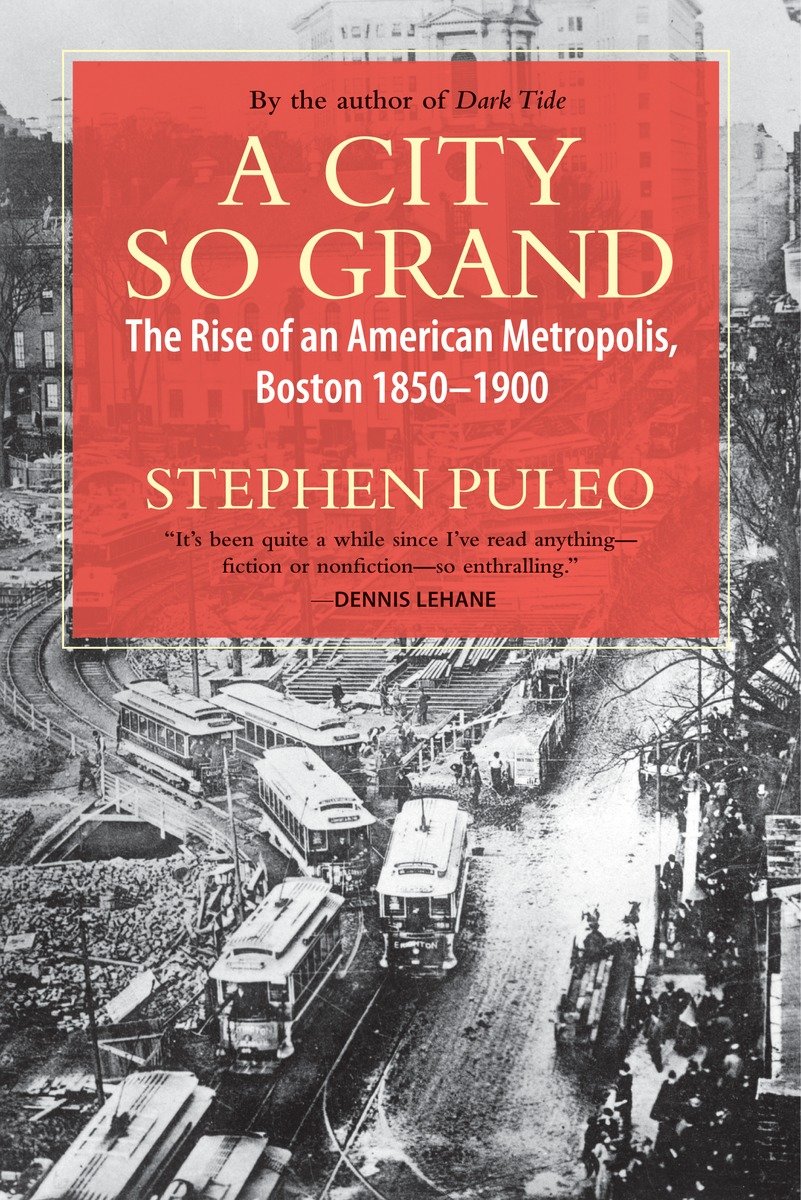A City So Grand: The Rise of an American Metropolis: Boston 1850-1900
15.00 JOD
Please allow 2 – 5 weeks for delivery of this item
Add to Gift RegistryDescription
A lively history of Boston’s emergence as a world-class city—home to the likes of Frederick Douglass and Alexander Graham Bell—by a beloved Bostonian historian “It’s been quite a while since I’ve read anything—fiction or nonfiction—so enthralling.”—Dennis Lehane, author of Mystic River and Shutter Island Once upon a time, “Boston Town” was an insulated New England township. But the community was destined for greatness. Between 1850 and 1900, Boston underwent a stunning metamorphosis to emerge as one of the world’s great metropolises—one that achieved national and international prominence in politics, medicine, education, science, social activism, literature, commerce, and transportation.Long before the frustrations of our modern era, in which the notion of accomplishing great things often appears overwhelming or even impossible, Boston distinguished itself in the last half of the nineteenth century by proving it could tackle and overcome the most arduous of challenges and obstacles with repeated—and often resounding—success, becoming a city of vision and daring.In A City So Grand, Stephen Puleo chronicles this remarkable period in Boston’s history, in his trademark page-turning style. Our journey begins with the ferocity of the abolitionist movement of the 1850s and ends with the glorious opening of America’s first subway station, in 1897. In between we witness the thirty-five-year engineering and city-planning feat of the Back Bay project, Boston’s explosion in size through immigration and annexation, the devastating Great Fire of 1872 and subsequent rebuilding of downtown, and Alexander Graham Bell’s first telephone utterance in 1876 from his lab at Exeter Place.These lively stories and many more paint an extraordinary portrait of a half century of progress, leadership, and influence that turned a New England town into a world-class city, giving us the Boston we know today.
Additional information
| Weight | 0.43 kg |
|---|---|
| Dimensions | 2.04 × 15.24 × 22.86 cm |
| PubliCanadation City/Country | USA |
| by | |
| format | |
| Language | |
| Pages | 312 |
| publisher | |
| Year Published | 2011-5-17 |
| Imprint | |
| ISBN 10 | 080700149X |
| About The Author | Stephen Puleo is the author of the Boston Globe best seller The Boston Italians and of the critically acclaimed Boston-area best seller Dark Tide: The Great Boston Molasses Flood of 1919. A former award-winning newspaper reporter and contributor to American History magazine, he holds a master’s degree in history and teaches at Suffolk University. He and his wife, Kate, live in the Boston area. |
“It’s been quite a while since I’ve read anything—fiction or nonfiction—so enthralling.”—Dennis Lehane“Stephen Puleo’s new book is more evidence of the urban role in civilization, as it reminds us of the remarkable accomplishments of late nineteenth-century Boston.”—Edward Glaeser, The New Republic “Stephen Puleo, a historian of Boston who has written about the Great Molasses Flood of 1919 and the Italian community in the North End, takes a wider view in his new book, A City So Grand. The cast of characters includes Frederick Douglass and Alexander Graham Bell. The Big Dig equivalents are the opening of the city’s underground subway system and the Great Boston Railroad Jubilee marking the beginning of train service to Montreal and Chicago.”—Jan Gardner, The Boston Globe “‘No period in Boston’s history was more dynamic’ than the second half of the 19th century, writes Puleo in this smoothly narrated account of that time and place. . . . Despite tensions and disasters, Boston emerged as one of the world’s leading cities. . . . A thorough history.”—Publishers Weekly |
|
| Table Of Content | Part One: A City So Bold Chapter 1: Abolitionists and the Fugitive Slave Law Chapter 2: The Great Railroad Jubilee Chapter 3: The Irrepressible Irish Chapter 4: Filling the Back Bay Chapter 5: The Gallows Glorious Part Two: A City Transformed Chapter 6: No Turning Back Chapter 7: War Chapter 8: Peace, Expansion, Perserverance Chapter 9: An End and a Beginning Part Three: A City So Grand Chapter 10: The Centennial, the Sensational, and Beyond Chapter 11: Breaking New Ground Epilogue Acknowledgments Bibliographic Essay Index |
| Excerpt From Book | CHAPTER ONEI think we must get rid of slavery, or we must get rid of freedom.—Ralph Waldo Emerson, 1856 Tuesday, April 8, 1851. The conspirators would wait one moreday, and then strike under cover of darkness. They knew full well the risks—arrests, fines, perhaps prison—butthe justness of their cause outweighed any personal consequences,and the timing of events made delay impossible. Though hastily conceived,their plan withstood scrutiny; sound in concept, its brazennesswas equaled only by its simplicity. The men stood clustered in a tight circle, their voices low, theirdemeanor somber, unaffected by the disbanding crowd, which stillbuzzed with excitement. The boisterous meeting had ended, butthose who attended would long remember the thunderous speechesdelivered inside the Tremont Temple this day, ten hours of addressesthat represented more than rhetoric to the small band of abolitionistswho now gathered in one corner of Boston’s downtown meetinghouse.To them, the day’s oratory cried out for justice and demandedaction. Led by the fiery Unitarian minister Thomas Wentworth Higginson,these men saw their mission in the clearest of terms: free theimprisoned runaway slave Thomas Sims and convey him to a stopalong the Underground Railroad for eventual safe passage to Canada. If they failed, Sims would be hauled back to Georgia to face punishmentfrom his former owner and resume a pitiful existence in slavery’sshackles, a life he had fled when he stowed away on a brig that leftSavannah in late February. The twenty-three-year-old Sims had already overcome dauntingodds on his journey to freedom, making his current confinementall the more tragic. For two weeks during the vessel’s wintry northernvoyage he had escaped detection, avoiding the crew and providingfor himself. Then, on March 6, with Boston’s lights in sight, thebrig’s mate discovered the stowaway. “Sims was cursed at, struck, andbrought before the captain,” according to one newspaper account, andthen locked in a cabin while the ship lay anchored outside BostonHarbor. But the crew had failed to take his pocketknife. That night,Sims jimmied the lock, lowered one of the ship’s lifeboats into thewater, and rowed toward freedom. He landed in South Boston and“took lodging in a colored seaman’s boardinghouse, and while in thecity, made no effort to conceal himself.” But then Sims made a grave mistake. Destitute and hoping to arrangefor funds to bring his free wife and children to Boston, he wiredto Savannah for money—and the telegram included his return address.Somehow, Sims’s whereabouts reached one James Potter, whoclaimed that Sims was his property. One week later, Potter’s agent,John Bacon, arrived in Boston seeking Thomas Sims as a fugitiveslave. Bacon secured a warrant for Sims’s arrest on the morning ofApril 3, and Boston police cornered the runaway slave on the streetthat evening. Fighting for his freedom, Sims stabbed officer Asa Butmanin the thigh with his pocketknife, snapping the knife in two.Police then overpowered Sims, tossed him into a carriage, and drovehim to the courthouse; witnesses heard him cry, “I’m in the hands ofkidnappers!” Now, five days later, a plan had emerged to disentangle him fromthose clutches. Only a handful of men would know details of the plot, and fewerstill would take part in the actual breakout. This had less to do withthe need for secrecy than with the reticence of the larger abolitionistcommunity to act boldly, a stance that had prevailed during thegathering to discuss the fugitive slave’s case. In a hall that one accountdescribed as “packed almost to suffocation” with an excited and angryaudience, Higginson had delivered a spellbinding speech calling for decisive action, even force, to save Sims, during which the assembly“trembled” and the community “was brought to the eve of revolution.”But the speaker who followed Higginson, influential attorneyCharles Mayo Ellis, protested the clergyman’s combative tone, issueda plea for calm, and, Higginson despaired, “threw cold water uponall action.” Instead, the group adopted resolves condemning the FugitiveSlave Law—which forced Northern states to return runawaysto bondage—and the proceedings against Sims. “The law and ordermen prevailed,” one abolitionist reported. Higginson concluded: “Itwas evident that if anything was done, it must be done by a very few.”He wasted no time. Immediately following Ellis’s address, Higginsongathered a small group of men who were inclined to do morethan pass resolutions, men who “seemed to me to show more fightingquality than the rest.” |
Only logged in customers who have purchased this product may leave a review.






Reviews
There are no reviews yet.